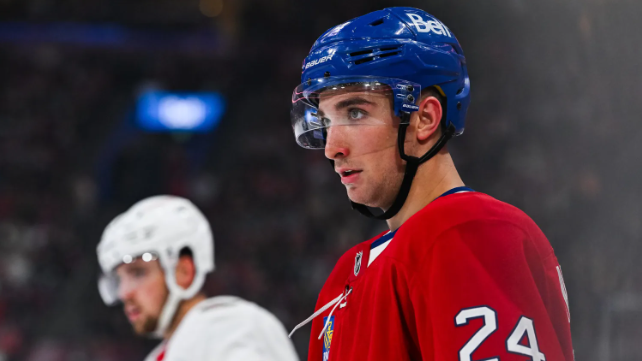There’s a prevailing belief that Logan Mailloux will never make a significant impact as an NHL defenseman due to concerns about his defensive skills.
This viewpoint gained traction in the hockey community a couple of years ago, initiated by a handful of independent scouts and social media commentators. Some have held on to this belief without taking a closer look at his gameplay since then.
However, Mailloux’s defensive abilities have notably improved since his final junior season. Under Dale Hunter, he played 27 minutes per game during London’s extended OHL playoff run, and last year, as a rookie AHL All-Star, he showed substantial growth in his defensive zone as the season progressed. Considering he had minimal playtime over two seasons and entered the OHL as a rookie, it was unrealistic for anyone to expect him to be a polished defensive prospect at that stage. The assumption that he would be a bust was premature, possibly influenced by his highly publicized incident in Sweden during his draft year.
This season, after just seven games, his goals-against rate stands impressively at 1.89 per 60 minutes, one of the best in the league.
This statistic becomes even more impressive given that he is averaging 4.52 points per 60 minutes. His +2.63 differential leads the league and ranks among the highest I have ever recorded. He is just 21 years old and has 181 games of OHL and professional experience under his belt.
Historically, the Canadiens had a large, strong, mobile defenseman with a powerful shot who was similarly inexperienced during his first Montreal training camp after just one OHL season. Larry Robinson developed over 1.5 seasons in the AHL before joining the Canadiens and had a successful career.
This isn’t to say Mailloux is destined to be a Habs Hall of Famer, but he shares some traits with Robinson, and a player with his skill set will be a valuable asset for the Canadiens when he is ready.
Leading the AHL in points per game is a strong start, and his two-point performance, including an overtime winner in Rochester, showcases his confidence and capability at the AHL level. Once the Canadiens decide to call him up, it is likely to be a permanent move.
Is Mailloux a flawless defender? Not at all. Occasionally, he gets out of position, generally due to over-aggression offensively, which can reflect his confidence. This tendency can be managed at the NHL level, and he has already indicated that he is less prone to taking unnecessary risks in higher competition.
It’s crucial for a young defenseman in the minors to believe he excels at that level, and currently, he does on the offensive end. His speed allows him to recover defensively when he pushes forward, and he works hard to get back when caught out of position. While his efforts may lead to occasional slip-ups for his team, the offensive contributions he brings effectively balance this out, as his differential per 60 minutes clearly shows.
Any careless decisions he makes stem more from his inexperience than any supposed deficiency in hockey IQ. With more game time, he will better understand his limitations, and his coaches will help him refine his game, reducing his overly aggressive tendencies as he matures. Training a talented but wild player is often easier than motivating a less driven one, but it requires time and patience.
When his team was down 1-0 against Rochester, Mailloux played a pivotal role in turning the game around with his offensive skills. He is currently one of the most formidable weapons in the AHL on the power play, as opponents must respect his powerful shot. He possesses the hardest point shot in the league, both on wrist shots and slap shots. His perfect setup for Barre-Boulet’s power-play goal showcased his shot while deceiving defenders with his pass.
Mailloux’s one-on-one defending has dramatically improved since he first joined London’s lineup. He no longer gets caught flat-footed, and his combination of mobility, reach, and strength makes him tough to beat. His gap control has also become more effective as he grows more confident.
In the defensive zone, his skating often helps extricate his team from tough situations. His reach and puck protection make him hard to check, allowing him to carry the puck out of trouble. His outlet passing has improved as well, and he rarely makes careless cross-ice passes. He takes the time to make smart plays, even if it means taking a hit.
His puck retrieval skills are excellent, and he has great straight-line speed, allowing him to win puck races and demonstrate the patience to maintain possession until an appropriate passing option arises.
Against Rochester, Mailloux played over 25 minutes, including crucial shifts in overtime, indicating that the coaching staff is confident in his defensive abilities. Averaging over 2 minutes per game on Laval’s top penalty-killing unit further disproves the narrative that he is defensively weak.
The Canadiens are managing his development well by allowing him a few brief call-ups while he gains valuable experience in Laval, where he plays over 22 minutes a night. By the trade deadline, when they may look to trade David Savard, David Reinbacher should be ready to step into Mailloux’s place in Laval, ensuring a seamless transition for the team.
